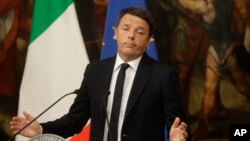Italy appears headed for weeks of political turmoil after voters in a national referendum Sunday rebuffed a constitutional reform package proposed by Prime Minister Matteo Renzi, who announced his resignation as the scale of the defeat unfolded.
At a short news conference within two hours of the polls closing, the 41-year-old Renzi conceded defeat, saying, “I have lost, and I say it out loud.” He said he will offer his resignation Monday to Italian President Sergio Mattarella.
“We leave with no regrets. My government ends here,” he said. Earlier, he tweeted to his followers, "Thank you all, anyway…Long live Italy!”
With the votes from 20 regions counted, the tally stood at 59.3 percent voting against Renzi’s proposal, with only 40.7 percent backing the prime minister. Opposition party leaders, including Beppe Grillo, head of the maverick populist Five Star Movement, called on President Mattarella to hold early parliamentary elections.
“We need to vote as soon as possible,” said Grillo. There was speculation in Rome that the Italian president would appoint a caretaker government headed by the country’s current finance minister, Pier Carlo Padoan.
Renzi campaigned furiously right up until the last moment, begging Italians to endorse the sweeping constitutional changes.
But in the nationwide vote they rebuffed his plea, setting the cash-strapped country on a course for likely months of political upheaval and adding to mounting fears of a possible new Europe-wide financial crisis.
Fears of uncertainty
The fear now is that market uncertainty could derail plans to recapitalize Italy’s debt-laden banks. That, in turn, could unleash a chain reaction, impacting Europe’s rickety banking sector more broadly, analysts worry.
The Financial Times warned last week that market turbulence after a "no" vote risked bankrupting eight Italian banks.
“The threat is very real and could ultimately force the European Central Bank to take action,” according to Martin O’Rourke, managing editor of tradingfloor.com, a financial news site owned by the Saxo Bank Group, a Danish financial firm.
Italian and European central banks promised in the run-up to the referendum to do “whatever it takes” to stabilize markets in the wake of a "no" vote, but it remains unclear whether the ECB has the resources, or the political backing by European leaders, to defend Italy from a sustained assault on the country’s bond markets by investors.
With the recent rise of populism on both sides of the Atlantic, and in the aftermath of the Brexit vote by British voters to leave the EU, the rejection of Renzi’s reform package is being seen by many media commentators as another example of the populist wounding of political elites. Matteo Salvini, head of the anti-immigrant Lega Nord (Northern League) party said as the results came in that the vote was one “against the establishment.”
But the battle over Italy’s referendum was never a completely neat matter of populist versus establishment.
Aimed at streamlining government and centralizing power to a degree not seen since the Fascist era of Benito Mussolini, the Renzi reforms - if they had been approved - would have seen Rome claw back powers from the regions, scrap a provincial layer of government notorious for its corruption, and turn the mainly elected Senate into a much smaller appointed body subordinate to the Chamber of Deputies.
According to Renzi, Rome needed to be empowered to be able to effect a host of urgent structural reforms and to overcome entrenched special interests.
While corporate, labor and narrow regional interests feared a more powerful government, one able to reform widely, opposition mounted among centrists and radicals as well, including among progressives in Renzi’s own leftist Democratic Party.
‘Stuck in the mud’
Both Renzi and his opponents sought to grab the populist mantle. The former standup comic Grillo argued that an affirmative vote would entrench the corrupt political class.
“We are a country that’s stuck in the mud,” Grillo told a crowd of several thousand at an eve-of-vote rally Saturday in the northern industrial city of Turin.
The Five Star Movement wants Italy to ditch the euro and stands a good chance of becoming the largest party in any early elections — a prospect that spooks financial markets and European leaders.
In the lead-up to the vote, and living up to his nickname, il Rottamatore or the scrapper, Renzi pitched a "yes" vote as the populist choice, arguing the referendum amounted to a once-in-a-lifetime chance to change Italy.
Mimicking the tactics of Donald Trump and Britain’s successful Brexit campaigners, he couched his referendum campaign as the silent majority versus the establishment.
For many voters, the referendum was “a chance to have their say on Renzi himself and his government,” especially after he linked his future to the outcome, according to Mario Calabresi, editor of La Repubblica newspaper.
Renzi’s government had amassed a large number of reforms but unemployment has remained high.
The economy has grown under Renzi but only at 0.8 percent last year, a negligible increase, says trade union leader Susanna Camusso, who argues that even that slight jump is linked more to external factors such as the falling price of oil and the weaker euro.
How the bond markets react to Renzi’s defeat will be crucial — for Italy and the EU.
Last week, Renzi started to try to pull together ahead of the crunch vote a $5 billion rescue package for Banca Monte dei Paschi de Siena, the country’s most vulnerable bank and Italy’s third largest lender. The government held talks with the Qatari royal family and U.S. hedge funds owned by George Soros and John Paulson.





